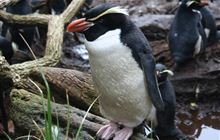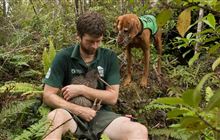Penguin dies after Kakanui dog attack
Archived content: This media release was accurate on the date of publication.
Introduction
DOC is reminding the public that moulting penguins are particularly vulnerable at this time of year after a dog killed a Snares crested penguin at Kakanui, near Oamaru.Date: 31 January 2018
“Penguins come ashore to moult all along our coastline so people need to be vigilant, particularly where dog walking is popular,” says DOC Ranger Tom Waterhouse.
“Locally this includes around Oamaru Harbour, Kakanui beaches, Beach Road from Cape Wanbrow to Awamoa creek and the area around Moeraki and Shag Point.; There are restrictions on where people can exercise their dogs off lead so check before you go.”
DOC picked up the moulting Snares crested penguin with fresh puncture wounds at Campbells Bay on 18 January 2018. The penguin was sent to Dunedin’s newly opened wildlife hospital for treatment but died not long after arriving. Vet Lisa Argilla undertook a post mortem on the bird and says it died from internal trauma characteristic of a dog attack.
"More often than not, uncontrolled dogs around penguins has a lethal outcome. In my experience the internal injuries these birds sustain from dog attacks are usually catastrophic and the external injuries do not show the extent of the damage,” says Lisa Argilla.
“Dogs usually shake the bird very violently leading to internal injuries that can cause very slow and painful deaths for the birds.”
Moulting occurs in most species of penguin from January to the end of April but kororā/little penguin can start as early as November. In New Zealand the main species to watch out for are kororā, hoiho/yellow-eyed penguin and tawaki/Fiordland crested penguin.
“We also get occasional visitors such as this Snares crested penguin from the subantarctic islands along with erect crested and eastern rockhopper penguins,” says Tom Waterhouse.
“Unlike other bird species, penguins replace all their feathers at once. During this time, penguins spend two to three weeks on land and rarely go to sea so it is a particularly vulnerable period for them. They are easily stressed, there’s an increased risk of de-hydration and starvation and they cannot escape predators easily.
“Dog owners are required by law to ensure their dog does not injure, or cause distress to wildlife and other animals, whether the dog’s on a lead or running free. Even the most loving or well behaving dog is capable of hurting or scaring a penguin,” says Tom Waterhouse.
“Dog owners and other beach goers need to be vigilant and help us to protect the awesome native wildlife we share our beaches with.”
Tips for dog owners
- Check the local council website for rules on dog walking restrictions.
- Always have a lead handy and keep your dog under control even if off the lead.
- If you see penguins or other wildlife put your dog on a lead and keep away.
- Warn other dog owners of nearby wildlife and observe quietly from a distance.
- Notify DOC on 0800 DOCHOT (0800 362 468) of any wildlife being harassed by people or dogs.
- Notify Waitaki District Council (03 433 0300) of any dogs not under control.
See DOC blog Dogs and wildlife: Being a responsible dog owner for more tips on how to ensure your dog can coexist with native wildlife.
Contact
For media enquiries contact:
Email: media@doc.govt.nz


